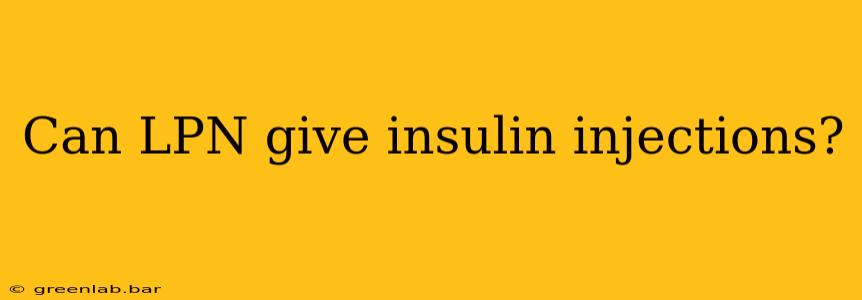Licensed Practical Nurses (LPNs), also known as Licensed Vocational Nurses (LVNs) depending on the state, play a vital role in providing patient care. However, the scope of their practice, including the administration of medications like insulin, can vary significantly based on state regulations, employer policies, and individual training and certifications. This article clarifies the complexities surrounding LPN insulin administration.
State Regulations: The Key Determinant
The most crucial factor determining whether an LPN can administer insulin injections is state law. Each state's Board of Nursing establishes the scope of practice for LPNs, defining the tasks they are legally permitted to perform. Some states explicitly authorize LPNs to administer insulin under specific conditions, while others restrict this responsibility to Registered Nurses (RNs) or physicians.
Therefore, there's no single answer to the question. To find out if LPNs can administer insulin in your specific location, you must consult your state's Board of Nursing website or contact them directly.
Beyond State Law: Other Influencing Factors
Even in states where LPNs are legally permitted to give insulin injections, several other factors come into play:
1. Employer Policies:
Healthcare facilities, including hospitals, nursing homes, and clinics, often have their own internal policies regarding medication administration. These policies may further restrict or expand the roles of LPNs, potentially limiting their ability to give insulin even if state law allows it. Always check with your specific healthcare provider's policies.
2. Individual Training and Competency:
Even if both state law and employer policies allow LPNs to administer insulin, individual LPNs must receive proper training and demonstrate competency before performing the task. This training usually involves:
- Detailed instruction: Understanding insulin types, dosages, injection sites, and potential complications.
- Practical skills training: Mastering the techniques of insulin administration, including safe injection practices.
- Assessment and monitoring: Learning to assess patients' blood glucose levels and recognize signs of hypo- or hyperglycemia.
- Documentation: Properly charting medication administration and patient response.
LPNs without this specific training should not administer insulin, regardless of legal permissions.
3. Type of Insulin and Patient Condition:
The type of insulin used and the patient's overall condition might influence whether an LPN is authorized to administer the injection. Complex insulin regimens or patients with unstable conditions may require the expertise of an RN.
Patient's Responsibility:
Patients should always:
- Clarify with their healthcare provider: Confirm who will be administering their insulin injections and under what circumstances.
- Ask questions: Don't hesitate to ask your nurse about their qualifications and experience in administering insulin.
- Understand their medication regimen: Become familiar with your insulin type, dosage, and administration schedule to actively participate in your care.
Conclusion: A Multifaceted Issue
Whether an LPN can give insulin injections is not a simple yes or no answer. It's crucial to consider the interplay of state laws, employer policies, individual LPN training, and patient-specific needs. Always verify with the relevant authorities and your healthcare provider to ensure the safe and appropriate administration of your medication.

